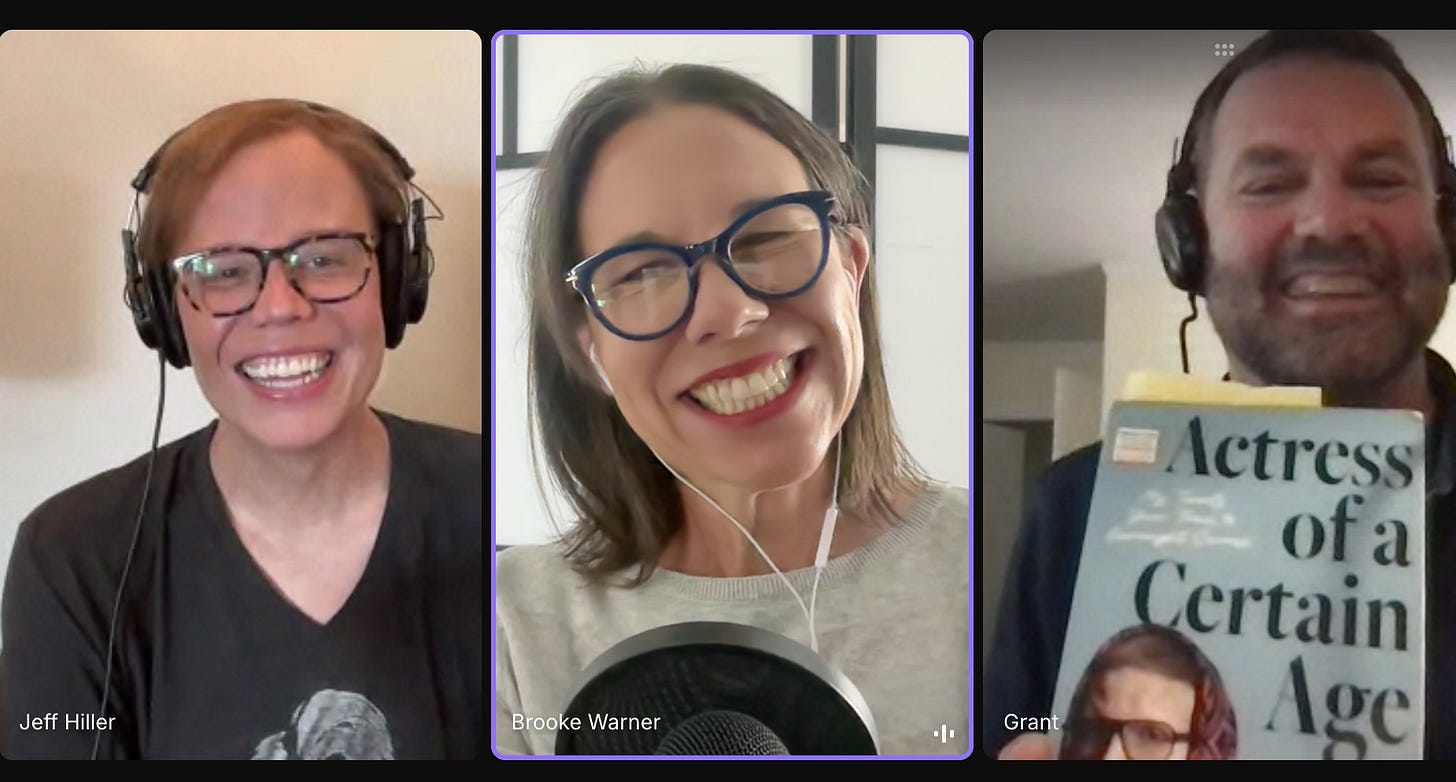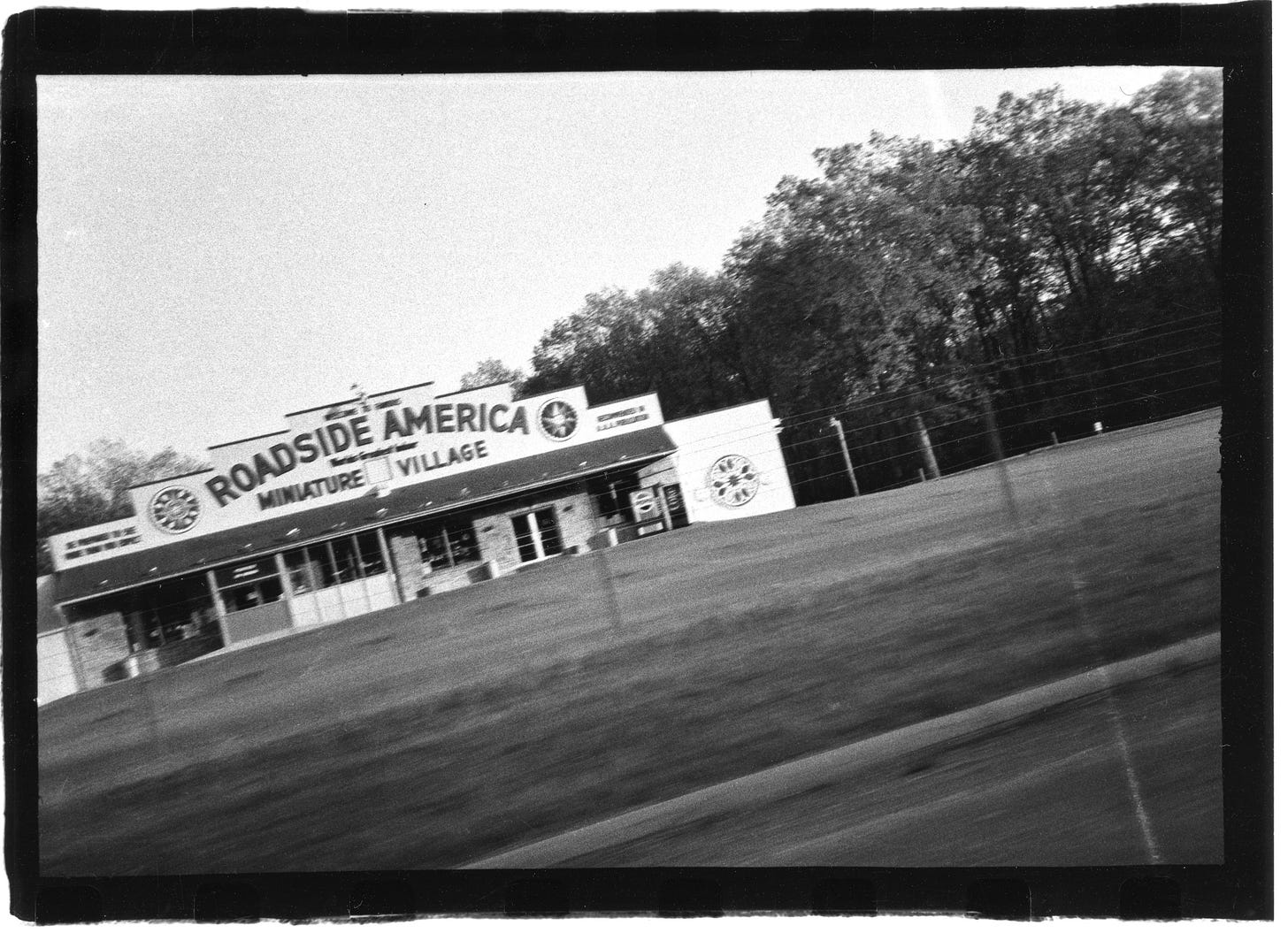When we started recording our Memoir Nation podcast episode with Jeff Hiller, I paused to ask him the most important question of all—a very personal question.
Would he be my friend?
As in close friend. Friends who swap messages throughout the day to check in, buck each other up, joke around, and just be human together. Human as in Jeff’s character Joel, on Somebody Somewhere, who has a rivetingly human friendship with his best friend Sam, played by Bridget Everett.
Yes, my question sounded a little stalkerish. But I am a little stalkerish when it comes to Jeff Hiller.
He responded to the question with his distinctive, spirited cackling laughter—which erupted many times during our interview—and he discussed how playing Joel caused many to view him as their ideal friend. But the irony is that while he’s viewed as an idealized, perfect friend now, he grew up without many friends.
“Where were you when I was 12?” he asked, jokingly yet not. “That’s when I really needed you.”
His journey through different types of rejection and bullying is a big part of his new memoir, Actress of a Certain Age—and yet it’s a memoir that is also uproariously funny. Jeff relives his experiences from being bullied as a gay kid in Texas to his stint as a social worker before landing his breakout role in Somebody Somewhere—at a “certain age”!
His memoir is actually one-part instruction manual in how to keep practicing your art in the face of rejection. He’d been acting for 20 years with only a series of bit parts to show for it—and considerable debt—and he’d just hit bottom with a mid-life crisis.
As he puts it in his memoir:
“That’s why Somebody Somewhere is so special. It is a show about hope. When I told myself that acting was a dead-end street, I didn’t take concrete steps toward quitting because deep down, I still had hope that I could make a living doing the thing I loved.”
Friendship as drama
Jeff and Sam’s friendship feels like an ongoing slumber party. They feel closer than family, and there’s something about them that seems better than a romantic relationship—to the point that you can’t imagine them not being together as partners for all of eternity.
Maybe it was because I was experiencing a friendship break-up of my own when I watched Joel and Sam have their brief break-up in the show, but I found myself crying more for them than any other screen couple break-up I’ve experienced. Their friendship defines the best kind of love—full of encouragement, warmth, forgiveness, and then … their joyous, soul-binding, wondrous laughter.
As one who revels in personal friendships, who has been blessed with the riches of so many amazing friends, I’ve recently become aware of how little I actually write about friendship. Yet it is such dramatic terrain.
I often say that my friends have been my education, especially early on. I didn’t go to the best high school academically. In fact, it was really a joke, so my friends and I often skipped class and drove around for literally hours listening to music and talking.
But not just talking. We explored ideas and books. We confessed every foible and hope and wound our young souls held. We were always looking for new, different music, so we drove to Des Moines and Iowa City for punk rock shows and experimental classical concerts.
That was the education that mattered most to me—and still matters to me, because I feel like my friends are always introducing me to new things in life.
My favorite friendship drama in a novel is the four volumes of Elana Ferrante’s brilliant Neapolitan series. The series follows the lives of two intelligent girls, Elena Greco and Lila Cerullo, from childhood in a poor neighborhood on the outskirts of Naples, Italy to adulthood and old age.
The portrayal of a close female friendship is at the center of the novel as Lena measures herself and her achievements against Lila. I think our friendships, especially our lifetime friendships, invite in comparisons like that, but in the end, one definition of the best kind of friendship is one where you don’t compete, and, in fact, you feel comfortable failing or admitting your failures—as with Joel and Sam.
In fact, you can embarrass yourself in the best friendships. You don’t need to put on airs or carry a shield. You’re not tallying up points. You’re just friends.
When I think of friendship novels, they tend to be by and about women, not men, which I find interesting. Or the friendship novels about men come with quotation marks around friendship because they’re often about a shared activity or pursuit.
I think of On the Road, by Jack Kerouac, for example. While the book is about two friends, the road is a shared activity, sort of like going to war, so while the novel is about them developing together and having adventures, it’s also about the road itself.
Most of my friendships are actually with women. I can’t think of any great male/female friendships in novels, and if they exist at all, the man is usually gay. There was the film When Harry Met Sally, which posed the question of whether straight men and women could be friends without ending up in bed, but then they ended up in bed.
I’d like to explore friendship of all kinds more because it forms such a central place in my life, and it’s seldom explored on the page.
Highlights from the interview: Jeff Hiller as celebrity
The subtitle of Jeff’s memoir is “My Twenty Year Trail to Overnight Success.” Jeff contextualizes himself as a celebrity in a funny way, poking fun at his own unexpected status.
“This is a book about what it is like to be an actor who isn’t famous. An actor who clawed, scraped, and fought their way to the lower middle rung of the ladder,” he writes.
That unexpected status is placed in the context of his love of the celebrity memoir genre, of which he’s read hundreds. He playfully refers to them throughout his memoir, especially as a way to explore aging and celebrity status.
I made the observation in our interview that “to be an American is to be obsessed with age,” and he loved talking about our expectations of achievement and status through the framework of aging. He joked that a catalyst for his mid-life crisis was the realization that there was no list of “50 top actors under 50”—that his time had passed.
“I am older than I ever intended to be,” he said.
Here are some outtakes:
On age
“It is one thing to rest on your laurels as you age, but it is a very different thing to be searching for laurels when you are on the wrong side of forty.”
On homophobia and being bullied
“The only nickname I had growing up was ‘faggot.’ Sorry if that word feels too harsh to read in a book. When you are called that every day for the first thirty years of your life, it sort of dulls the senses.”
On improv
“If improv could be snorted, I would have cooked it and injected it. To put it mildly, I was all in.”
On coming out of the closet—on stage
“ … you don’t need to change yourself to accommodate an audience—don’t hide your unique point of view, show it off. I hadn’t been in the closet about my sexuality, but I had been about my comedy, and it was time to come out! I’m here, I’m hilarious, get used to it!”
On performing—and persistence
“Performing is my greatest joy. If I were going to give it up, I would have done it before I spent twenty years of my life auditioning for obviously uninterested casting directors.”
Weekly writing prompt: a lost friend
In her short story, “The Ghosts of Wannsee,” the author Lauren Groff captures the precise moment when a friendship changes forever.
Write about a lost friend. Was there a formal break-up? A chilly silence? What caused the schism?
Write about the break-up from your point of view, and then write about it from theirs. See if you can better understand what happened. See if you can mend the friendship—still?
Please become a paid subscriber …
A subscription guarantees writing karma.
Because some quotes
“Sometimes being a friend means mastering the art of timing. There is a time for silence. A time to let go and allow people to hurl themselves into their own destiny. And a time to prepare to pick up the pieces when it's all over.”
—Octavia Butler
“It is easier to forgive an enemy than to forgive a friend.”
—William Blake
“Each friend represents a world in us, a world possibly not born until they arrive, and it is only by this meeting that a new world is born.”
—Anaïs Nin
Contact me about my one-on-one work with writers
Upcoming events
August 30: The Art of Brevity with Catamaran from 10:30 - 1:30 Pacific. Online—so you can attend from anywhere! Find out more.
September 28-October 1: One of the highlights of my year is teaching at the one-of-a-kind Okoboji Writers' & Songwriters' Retreat V News at Lake Okoboji in Iowa. This will be my third year, and the roster of faculty includes great writers, songwriters, and journalists. Early bird registration is still open! Find out more.
November 10-16: Kauai Writers Conference. What more needs to be said? Kauai! Writing! And … some of the most amazing faculty I’ve been a part of. Find out more.
Because a photo
This is one of my favorite photos from my new book, something out there in the distance.
Find out more about the book in my post, The story of my new book.
Write your story to this photo prompt and post it in the comments …







Beautiful piece, Grant!
I, too, feel blessed with friends (who I don’t see often enough) and would like to write more about what they mean in my life.
Sometimes I think friendship (true friendship) is the greatest of human relationships: two people choosing one another, allowing one another "in."